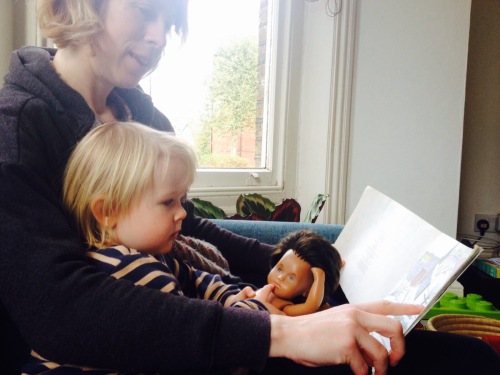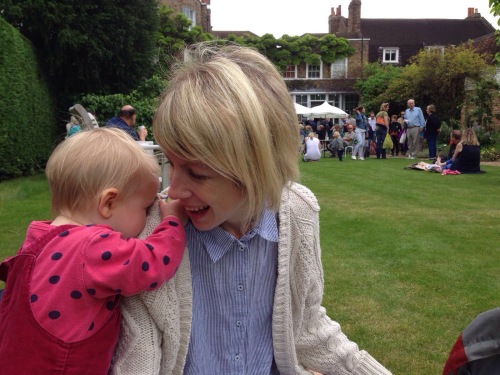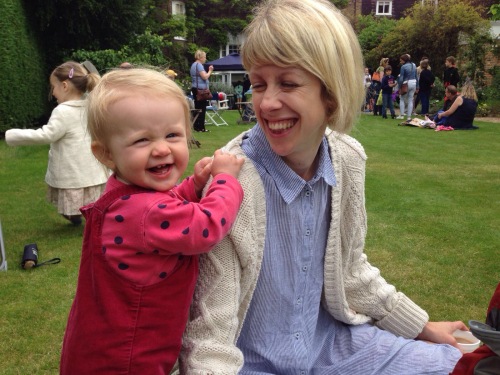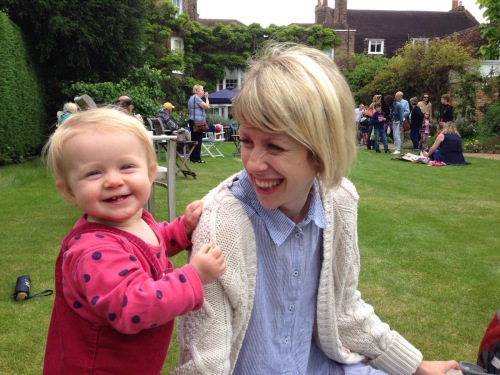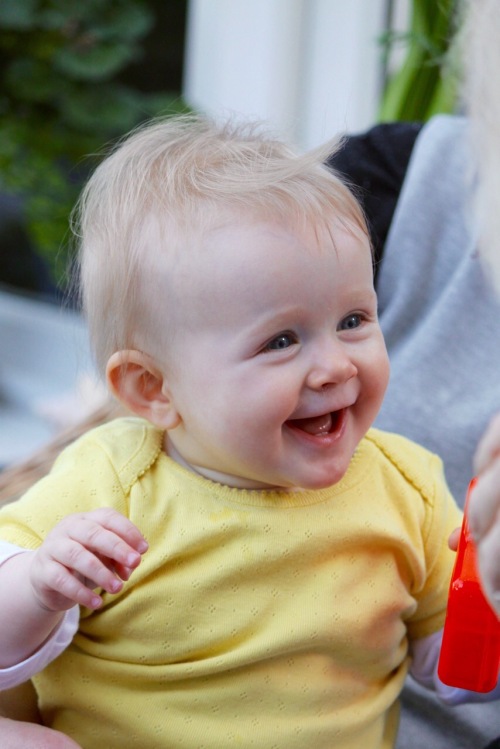Story of my life and others
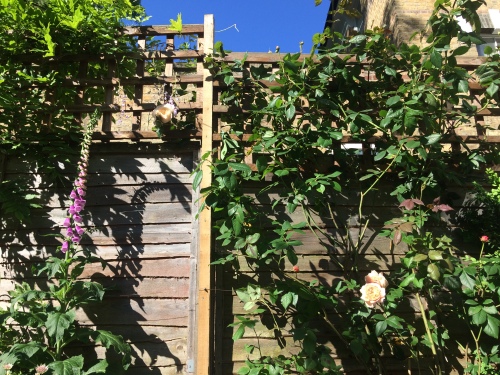
I’m standing behind a curtain playing hide and seek with my daughter, who doesn’t quite get the rules yet and keeps covering her eyes and running forward blindly shouting “I’m coming to hide you!” While I concentrate on not being found I am also doing my pelvic floor exercises and thinking about a book I’m reading, Story of Your Life and Others by Ted Chiang. The novella Story of Your Life was turned into the film Arrival with Amy Adams, and both the book and the film are perfect to me, so smart and original and economical with every word and moment.
I’m a supermum these days. Sometimes. I do lots of things at once and if there isn’t that much to do I create a scenario where life gets more busy. I like to be busy (and then moan about how much I have going on).
Early motherhood was a suspension of normal affairs. It seemed necessary to shed all things extraneous to us all staying alive, anything other than eating, drinking, occasionally sleeping for more than 45 minutes. I forgot that stories are a way of staying alive, that maybe they would have helped me. Back then I read books about babies, about having them and caring for them and what it did to you, the good and the bad, but I couldn’t read more than a page or two of any kind of fiction or anything about something other than parenthood. I have to conclude that you (I) can’t really get absorbed in other worlds when you are exhausted, in love and slightly depressed.
Now I have piles of books to read and it feels life-changing, really, to hold them in my hands. Lots are non-fiction which I find easier to commit to, but others are fiction, which I resist more and love harder. I have a Netflix playlist of films I can’t wait to watch (usually in two or three parts, from 8.15pm to 9.30pm before I can’t stay awake anymore). There is brain space for these things again. The simplicity of loving something that isn’t a person again feels wonderful. Stories that aren’t about me or anything to do with me. They reduce the intensity and myopia of motherhood. There seems more space to focus on the joy of it.
This rekindling seems to matter because I used to see the way I loved stories as integral to my identity. Books I loved, their physical and metaphysical manifestations, were as important as friends. In the children’s book A Snowy Day by Ezra Jack Keats, the hero Peter sits in a pink bath and “thought and thought and thought about” his adventures. I love this part because it’s a moment where nothing much happens except what’s in someone’s head, and also because it gives a child agency, personality and a kind of romantic identity. I don’t care what you’re passionate about, someone said to me once, just be passionate about something.
Should I be fully concentrating on my child while we play hide and seek, or is it alright for me to thinking about time travel? To (badly) paraphrase Donald Winnicott, we should concern ourselves less with what is optimum for a child and more on what is just fine for a child. I try and talk about this when I’m teaching yoga to mothers, about that part of you that you retain just for you that allows you to be happier, and better for your children. Along with your physical time and the activities in your day, your head is a space to juggle everything, get it right sometimes, get it wrong sometimes, try and be alright with that.
My little girl asks for her mummy a lot when I’m not there. I hold her in my arms every night until she’s asleep. I sometimes think I’ve ruined her by being so nice to her. I hope she has a better time being a girl than girls have so far had, and that she doesn’t carry around all the shit with her that girls so far have. I hope that women like her won’t have to have watershed moments where the world finally realises it’s not ok to suggest a massage after a “work meeting”. Probably her generation will battle with problems that will feel bigger: floods, famine, fuel and food shortages. Maybe she will be a gutsy female protagonist like Amy Adams is in Arrival. I have no idea whether we’ll always be close or whether she’ll hate me for years at a time. I know that now she always wants to be hugged by me and one day she’ll see me calling her on her phone and ignore it. Time!
Science fiction gives me strange, vivid dreams: in my post-Arrival dream we’re in the middle of some kind of apocalyptic crisis and I am scrawling the word humanity on a piece of paper. On waking it feels both meta and very silly, very on-the-nose, but I always was a better reader than a writer. Like most people. Not special. I feel so alright about that these days.
Filed under: gender | 4 Comments
The first place I ever lived
Here’s a little baby, one-two-three,
On his way to bed, what does he see?
Peepo!
He sees the landing mirror with its rainbow rim
And a mother with a baby
Just like him
He sees the bedroom door
The cot made ready
His father kissing him goodnight
His ball and his teddy.
– “Peepo”, Janet and Allan Ahlberg
Even when we are not in the same room, I think she is with me. I notice she has her own smell and I am surprised it is not the same as mine. When I close my eyes, I see her. I hallucinate her face in the wooden blinds, in the faces of the Queen, Dominic Cooper, Vince Vaughn, Yoda.
Time folds and unfolds like a concertina. We are knitted together, even though we are not combined physically anymore … Invisible spider threads pulse through the wall between us and I can hardly concentrate. I hover and follow them around the house and must tear myself away to work. Her whelps and squeals are siren calls, drawing me back. My cells are alert to only her. She is the queen of me. She runs me.
– “Longed-For Child”, Lucy Jones
Mothers are the countries we come from: sometimes when I hold my daughter I try to apprehend this belonging for her, to feel myself as solid and fixed, to capture my smell and shape and atmosphere. I try to flesh out her native landscape. I try to imagine what it would be like to have me as a mother, and when I do it seems remarkable to me that this mysterious and momentous transaction has been accomplished here, in my house.
– “A Life’s Work”, Rachel Cusk
My daughter is laden with the joy of a child who is learning to speak, full of valiant efforts and malapropisms and sweet mispronounciations. I put on her new top (noo stop!) and she runs to the mirror (mia! mia!) to see herself, then hoots with joy and kisses the reflection repeatedly. First thing in the morning she cries out, out! to come out of her sleeping bag, mamma light!, socks! brr! An elephant is an uffalant. A blanket is a planket. We read books (the ‘uffalo? she asks, her head on one side), and I know exactly what she is going to say at any point, and when she says something new I translate her, because I grew her and have watched her growing for so many seconds and hours and days and nights.
I know nothing about children but everything about her. I understand all her contexts, all the things she did as a baby, or I think I do anyway. All the constant second-guessing of early parenthood, where you’re trying to understand their temperament or whether they’re hot or cold or tired or hungry or experiencing existential malaise, is clear now. I understand the baby who never wanted to be put down and who took gargantuan efforts to get to sleep, who wanted to sleep on us and who could cry forever if you left her alone in her cot.
That baby leads in a neat line to my baby. At every nap and every night I lie with her until she’s asleep, and if I try and move before she’s fully out she laces her surprisingly vice-like grip around my neck and murmurs mumma and we lie, facing each other, holding each other. Every night she wants me to sing “The Wheels on the Bus” and I explain that that is not a sleepy song and instead I quietly recite Peepo, which I dutifully learned off by heart, until she is quiet and still. Periodically she stuffs her hand down my top and smooches her lips to kiss me on my cheek.
For a long time I felt like a failure for not managing to “teach her to go to sleep on her own”, and I was frustrated and angry about the hours and hours of every week where I am lying with her instead of living my life.
But this is my life. In the dark, I lie with her and think. Sometimes I get frustrated but I have accepted it as what is right for us, as all about the details of her and the details of me, and that this has not a single thing to do with anyone else.
In the drowsy hours when she cries in the night and I go and lie with her, I see us as if I’m hovering above our bodies, as if we are sisters or twins but this word is not right, and I struggle to describe our closeness with a words until I think mother. I just did not know it would feel like this until now. I think of those wormholes in Donnie Darko, the transparent wavering loops connecting things together, even though no one can see them, as if it’s a secret no one told us and only she and I understand.
In the garden she orders me to dig for worms (gig! gig! tiny verm!) and we go for long walks where I push an empty buggy and she pushes hers, full of items she has studiously collected: her soft toys, a Nectar card, her Meg and Mog collection and an empty Persil box. She walks next to me, understanding that she is a mirror of me, both of us with her buggies and her nearly beside herself with glee. She is full of the strange obsessions of toddlerhood: imaginary spiders she constantly points at, the scratches on her knee, things being hot or cold. Happy?, she asks anxiously, poking at her avocado. Sad, she decides, and drops it on the floor. The T-Rex in the British Museum is sad. Dave in Dogger, when he has lost Dogger and is bawling his eyes out, is happy. She collects and sorts and removes and adds so that I pick up a bag and find a Chanel blusher, a rubber dinosaur, Meg and Mog go to the Moon, a shell and the back door key.
She struggles with particular basic words but announciates Miss Hubbard, the jolly spinster from Postman Pat, like a BBC news anchor. She merrily waves goodbye to everything (bye bye poo!) and rotates her hand like she’s turning a door knob as she waves bye bye mumma in the morning. She goes to sleep murmuring every word and phrase she has ever learned, including saying goodnight to the four main Seinfeld characters.
She will be two in June. I wish I could bottle her.
Sometimes she is sad when I go to work and cries pitcha mumma and Adam has to show her the picture of us I have by the bed, where she is 4 months old and laughing up at me and me down at her as I hold her. We look like we really love each other.
The suggestion that you have to have children to live a life that feels meaningful and purposeful is ludicrous. But it is an easy shortcut to those things, which is perhaps why so many of us unoriginal people do what everyone else does and have babies. I used to have a regular listless “what is it all about” feeling, and she has cured me of that. I think it is gone forever.
I know one day she will need me less but I can’t quite face thinking about it right now. I think we might have another baby at some point but I can’t even slightly bear the thought that she won’t get my exclusive mothering, or that we will be a different family, or that we wil have to shake things up in her world, even if it means more joy in the long run. Maybe when she is a bit bigger it will be easier to countanence. But I don’t know. My heart, the space around us fills up with feeling as if it will all burst, as if there is no room for anything else.
Filed under: parenthood | Leave a Comment
Intervention
4 months: breastfeed Rosa to sleep. Try and put her down; she starts crying and ramps up and up. Pick her up and hold her. Lie down and try and sleep while she sleeps. Rock and jiggle her, try and put her down; she starts crying and ramps up and up. Pick her up, feed or jiggle her.
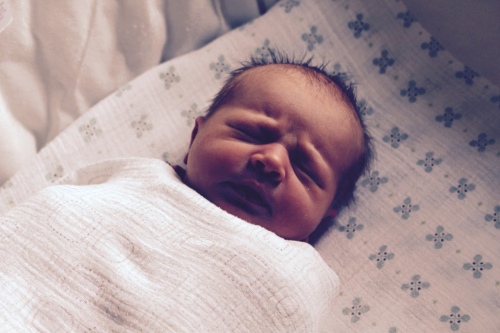
7 months: stop feeding her to sleep and hold her in the dark. She screams for a long time but eventually goes to sleep. Try leaving her for 5 min intervals to go to sleep by herself; she cries forever, though not as much as we do. Eventually she cries herself to sleep, but it isn’t like the books say (‘3 nights and you’re done!’). Eventually I say: I cannot do this anymore. She wins.
12 months: cuddle her to sleep. She wakes once or twice in the night but is easy to resettle and sometimes sleeps through. Then she starts to wake a lot and takes forever to settle: I am leaning over the cot for an hour at 12, at 3, at 5. I sit in the chair with her then try to sneak her back down in the cot. She often wakes soon after I think she’s finally asleep, just after I’m back in my warm bed.
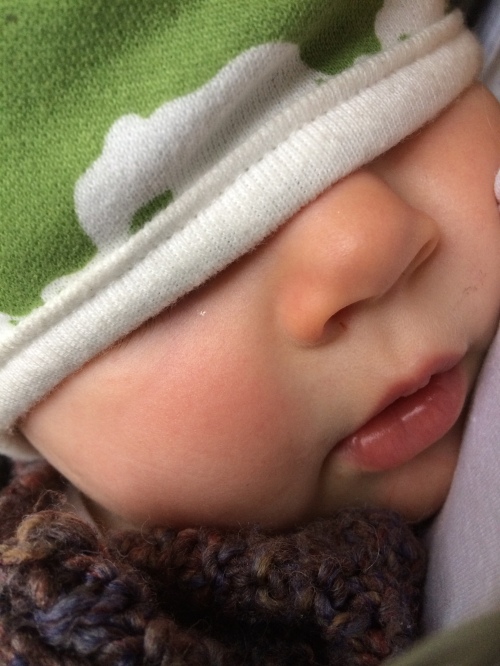
15 months: I realise months have gone by, the tiredness has seeped deeply into all the parts of me. We get rid of the cot, Rosa sleeps on her cot mattress on the floor and when she wakes and won’t settle, we sleep next to her on a mattress of our own. At first the loss of the stupid cot and its back-breaking necessities is glorious, the warmth of the mattress a luxury. I feel one million times better. She starts to sleep better, only waking once or so per night.
17 months: she starts to wake and wake and wake – 4, 5, 6 times a night. I start to co-sleep with her for most of the night, which can’t really be counted as rest at all. I get so tired and so cross with being grabbed and tweaked that one night I sit and weep loudly, and she does too. Enough, says her dad. This is an intervention. He starts to settle her in the night and I stay in bed, even though she screams for me at first.
What a shit-shower, we say. Unable to countenance any “sleep training” with a toddler who can scream MUMMY and crawl out of her bed and bang on the door, I work hard to resign myself to what is, for now, for however long now turns out to be. I practice deep-breathing exercises while she prods and crawls and tweaks. I know she will start sleeping better at some point. We just don’t know when.
I had written in a notebook: “What is difficult and exhausting about parenting? Most of the things you have to do and the things you have to feel.”
Making difficult decisions sometimes just means waiting for time to pass while you agonise and weigh up options that feel unappealing or even horrendous. Carrying on as we are is unthinkable. Really committing to making a change is not realistic, based on how hard she has found it when we try and change her behaviour.
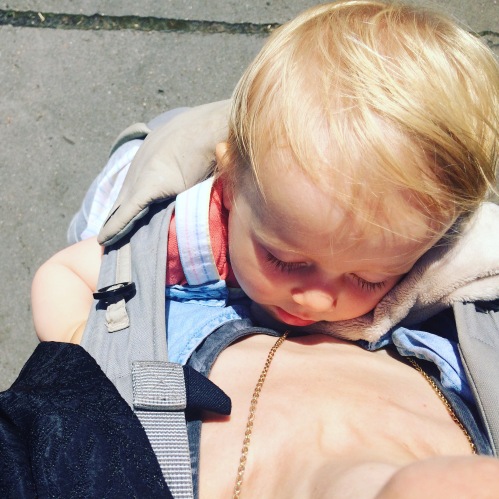
Perhaps the worst thing about parenting manuals: the way they don’t acknowledge the particularities of her or you. Or the way they make “being consistent” sound like a switch you can turn on, as if you are not are a weak human responding to phenomena in varying ways, as if you are also not dealing with another human with all their nuances. Also, I’d like to meet the baby who “settles with a t-shirt of comforter that smells of you” instead of the actual you. Is this baby some kind of moron?
We are mugs. We are soft as shit. We have done everything they said we shouldn’t do. We are dealing with a vocal, determined spirit. Would she be better off if we had firmer boundaries? Would we? Maybe. There would be more sleep and less resentment, though more crying and more guilt. It is irrelevant anyway. Would we do things differently next time? Probably not. We are here, the essence of us, parenting the essence of her.
Tired as when I had a newborn, I think violent thoughts about people whose children sleep through the night. I seethe for days about the mum who reassured me that there is “light at the end of the tunnel” because her three month old baby was sleeping for 11 hours a night and so my 19 month old toddler eventually would too. Some tunnels are so long. I think that having a baby who sleeps well must give people an utterly different early parenting experience than a having baby like mine. But what do I know. I am fucking knackered.
I think I am doing pretty well at work considering. I think we are doing pretty well at being a couple considering. At being human beings. Maybe the worst thing about parenting: no one says, well done. Well done for all the times you dragged yourself up from the bottom of the deepest sleep to be patient and kind for an hour 3-4 times a night, every night. Well done for not killing anyone. I used to hate those “all mums are heroes/should get a medal” chat. I don’t think that any more. I think parents should get Nobel prizes, and a three figure salary, and an annual holiday on a silent retreat with obligatory massages.
It is important for me to write this, to look back and remember this hellish element of it, to accompany my Instagram feed of dreamy baby time, to accompany my experience of her being almost 100% delicious, while she charges around chanting PAT (postman) or GAN GAN (granny) or HOT (radiator, tea, all foodstuffs) with her short little legs and round tummy and floppy hair. And while she crawls into my lap while I read her stories or says “Mummy. Mummy. Mummy. Mummy. Mummy.” when I get home from work. If she would only just sleep! Or if she would eat food that wasn’t hummus, toast or a cocktail sausage. But that’s another story.
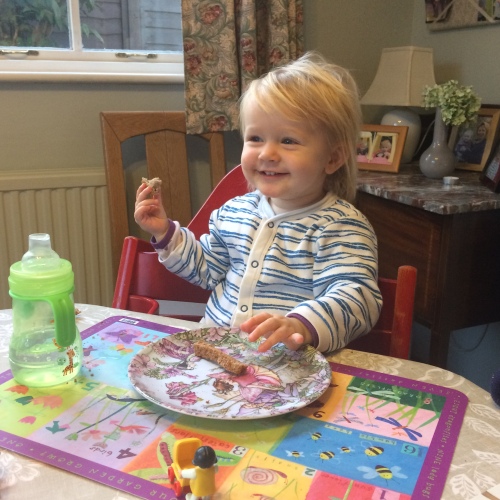
Filed under: parenthood | Leave a Comment
This line is from Jennifer Senior’s book All Joy and No Fun: the Paradox of Parenting, which is brilliant and one of those books you think will be about one thing but also turns out to be about what it is to be human. My favourite kind of book.
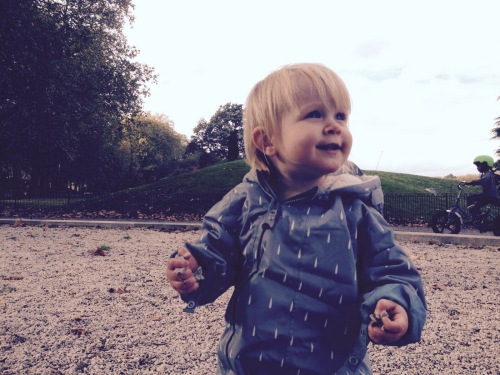
I have thought about sacrifice as I’ve progressed through my yoga teacher training and left my kid, and my partner looking after her, for the 200 hours of the training but also through the many additional hours of travel and yoga practice and teaching practice and homework, as well as working 3 and a half days a week. As I reach my final assessments I have felt quite emotional about the culmination of what I have sacrificed and what I have gained. So many times I was unsure I was doing the right thing, as I left a baby screaming for mum and her tired father (again), about whether (that terrible test) it was “worth it”. I missed her like how missing is, you know it, from the inside out, from your molecules and organs and muscles and arms.
It was harder because when I started my course, teaching a room of people yoga for an hour was the most frightening thing I could imagine doing. It was a thousand times more nerve-wracking to me than speaking at events or presenting to 150 people, things I had done which involved talking about something less personal to me and where I knew what the hell I was doing. My feelings stemmed from the vulnerability of an observed beginner and the feeling that comes from being really seen by people, from the exposure of sharing something private that you have experienced as profound.
But I have learned not to be terrified, to trust my competence a bit more. And after my last assessment I ran to the station then jumped in my car and broke several speed limits to get home for bedtime, as parents do, to see her face of joy through the front window as they waited for me. I fed her and she fell asleep on me with all the lights still on, and I thought of how far I’d come and about “putting yourself out there” to be seen, about doing things that are hard but that make your life better.
I kissed her mop of hair in the dark as I lay down next to her. My bias is terrible, I think she is the most funny and interesting girl I ever met. And so far I have found this second year of her life a lot more enjoyable than the first. I think then I was still coming to terms with the total massacre of my life as I knew it and the torture of sleep deprivation (I find the subject of parenting invites extreme hyperbole) and though my daughter was by no means a dreadful baby, I would certainly not describe her as chilled. Now she is older every day I see the joy of her personality. Seeing your kid start to have preferences (I’ve never seen anyone so full of glee when you put bread in the toaster in the morning, or laughed so much when you ask your partner for some seasoning and she overhears and says “Peppa”?), or imitate you saying “ooh” and laugh and laugh, or join in your sun salutations, or dance with you in the kitchen to Paul Simon’s Call Me Al, has been for me a lot more joy-invoking than holding a small baby who doesn’t do much except wriggle and cry. Isn’t it weird that when we decide whether to “have a baby” we think about the baby, rather than the 90 or so per cent of the rest of their lives when they are people? We should be thinking about “whether we want to be parents”.
In All Joy and No Fun there is a bit about Daniel Kahneman’s differentiation between our “experiencing selves” and our “remembering selves”, the latter being more rose-tinted and inaccurate than our actual daily lives. He says even if our remembering self is less exact it may still be more important, because it is this side of ourself that judges our whole life, evaluates its relative success or failure.
I was thinking about whether the present-moment awareness that yoga teaches can narrow the distance between our experiencing and remembering selves, because being present in a moment is kind of attempting to experience and remember at the same time, or at least bring the awareness that memory provides. As well as the onerous and repetitive nature of childcare there are many moments like this, moments of totally-present joy, which Jennifer Senior’s book is all about. Before I die, if my life flashes before my eyes, will my my best moments be holding a child in the dark? Will they be blowing raspberries or playing peekaboo with a teddy?
When Adam looks after her while I’m at work and they’re having a good day, he sends pictures of her tottering around in the park or looking out the train window. I think I’m going to die from joy, he says.
I am aware of the irony of distance in this second year of her life, that I have more time being a professional and having adult conversation and reading on the train and lunches in Soho (thank god, thank god for work, I often think) that afford me time to think about her in the great scheme of my life, space to miss her and energy to come back to her refreshed.
Being the person one little girl wants and loves more than anything used to make feel overwhelmed and trapped, and though it occasionally still does, now it is also the joy of my life, a personal miracle, one of the best feelings I have ever had. I suppose it is called love.
Filed under: parenthood | Leave a Comment
Gone, gone, totally gone
Our baby likes to take all the cards out of our wallets and sort through them, bowing her head, totally absorbed in the task. Things start to get lost: the Oyster card is gone, the credit card is gone. We look under sofas but they are are nowhere to be seen, in the mysterious way that things disappear in the house. She rifles through my wash bag and when I try to put my make up on on the train to work I find there is no mascara, no concealer, no blusher. All gone, I say in the mornings, as she finishes her last spoonful of cereal. GOH, she chants, GOH. Gone gone gone.
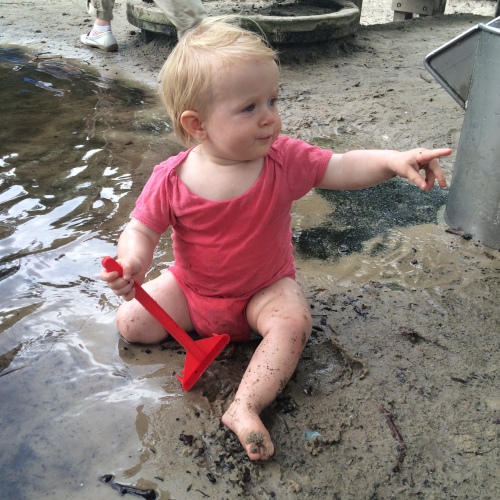
Baby sleep problems come and go, exhaustion comes and goes. It’s a blip in our lives which are a blip in human history. It is real and miserable too of course. Something Buddhists teach: life is always painful, but you don’t have to live your life in cycles of suffering (what do we do with pain, do we keep repeating it, feeling it over and over, creating stories about it, or can we feel it and let it go?)
She is more intrepid and sweet and funny than ever. She shouts CAAAA at the cat in Each Peach Pear Plum and the tiny cat on the bottom of a page in Peace At Last and at cats very far off in the distance when we go out for a walk. She picks up tiny specks of dust and inspects them closely. She tries to grab the bubbles I blow for her, that form and then disappear. She crawls like Mowgli, with her bum in the air. We walk up and down the hall, her holding onto both my hands and then in the following weeks, just one of my hands. I try and steer her in a certain direction but she has a very clear idea of where she wants to go. The time when she was tiny and would fit in the nook of my arm is totally gone.
I go on the residential for my yoga teacher training and at some point on the third day, pretty much everyone cries. I lie on the floor at the end of a class and pull my hood over my face and feel embarrassed to fit so neatly into a cliche, to be faced with this emotion in a room full of people. I don’t know if we’d still all be crying if we’d been meditating for days instead of the moving meditation that is yoga. In meditation you have to face yourself. This is a healthy way to live, close to our us-ness. And in the deep release of muscles there seems to be some additional undoing, as if stress and tension become held in our bodies: they are embroideries stitched with everything that has happened to us. We wear all of it, carry all of it, are capable of shedding it if we want to.
I stand in the dark and sing to the baby until she is asleep, until her body has gone all floppy and I can hear the steady rise and fall of her breath. My arms are tired from yoga and holding her. My arms are strong from yoga and holding her.
The week of my training, when I am lying on the floor, I feel completely insignificant and also the sense of an edge of a perception of vastness. There are so many things I cannot name. I contain multitudes: the only Walt Whitman line I know.
In our anatomy class we learn that, under our skin, our body is covered by a web of connective tissue called fascia. Our teacher tells us you can go to a laboratory to dissect it, that it’s dense and fibrous like a body stocking. Everything is joined up: if you massage a part of the back, the big toe will move.
We barely remember we have bodies, even though they are our constant companions. When we are worried they won’t sleep. When we are worried we feel physical pain, we vomit, we shake. When we experience serious stress our hair can fall out, our hearts can malfunction, we are more likely to get cancer. We feel insects crawl over us that we can’t see. Amputees feel limbs that are not there. We gasp and hold our breath and our heart rate increases and the body moves into fight or flight response – literally, neurons synapse and release a chemical which activate a receptor which in turn releases a stress hormone that jiggles and niggles and wiggles inside us. Our digestive system slows, our pupils dilate.
And we run and we feel better. We do yoga or walk or climb and we feel better.
Sometimes when I am sad I drink too much and sometimes I shop too much like Carrie fucking Bradshaw. But generally these days I think I am better at feeling sadness and not distracting myself from it, at standing in the way of it and letting it hit me like a truck.
In Ireland, I swim in the sea for the first time in years, blinking into the blue sea and the white light on the water and the bobbing horizon in front of me. Why have I left it this long to jump in the water? My hands and feet go numb and I feel free and very alive. It makes my life look like an old Super-8 film, a reel of perfection. But really my life can look however I want it to.
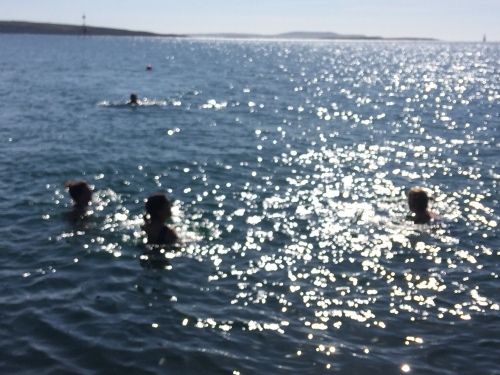
In another yoga class we read the Buddhist scripture, the Heart Sutra: Gone, gone, totally gone, totally completely gone. Something about this idea that not one thing lasts, that nothing has an essence and everything disintegrates, is deeply comforting to me. Not because it makes it easy to accept that things end. Just that it seems easier to live with the truth.
A friend deals with her existential crises by watching documentaries about space. The comforting enormity of galaxies, the resulting shrinking of our internal world. There are 100 thousand million stars in the Milky Way (the sun is just one of them) and outside of the Milky Way there are millions upon millions more galaxies with hundreds of thousands of millions of stars in them.
I don’t know if any of us have a true self, an essence. I don’t know if that is the edge of the perception I am sensing as I lie on the mat. Or maybe what I am sensing is another kind of revelation or truth, if there is such a thing.
I guess in the end we have to choose to believe in something, to make those things reasons to live. I think of the things I believe in and they swell up my heart, they swim in my head. They are totally here.
Filed under: parenthood, Yoga | Leave a Comment
A year is a long short thing
I hold this letter in my hand
A plea, a petition, a kind of prayer
I hope it does as I have planned
Losing her is more than I can bearI kiss the cold, white envelope
I press my lips against her name
Two hundred words. We live in hope
The sky hangs heavy with rain
– Love Letter, Nick Cave & The Bad Seeds
The whole of my year should be hers
Who has rendered already so many of its days intolerable or perplexed
But so many more happy
Who has left a shadow on my life, and my walls dancing over and over with her shadow
– from Autumn Journal, Louis Macniece
Goodnight room. Goodnight moon. Goodnight cow jumping over the moon.
– Goodnight Moon, Margaret Wise Brown
My daughter Rosa is one today. I can’t believe it. And also I can. The longest shortest most difficult best year of my life blah blah!
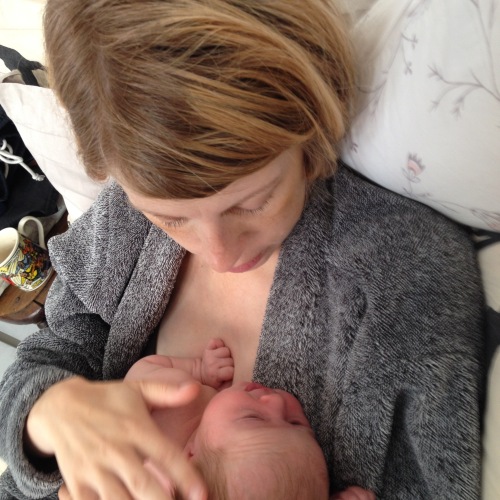 It was so hard at first. I was very anxious. I remember someone saying “this time next year she’ll be pottering around the garden and splashing in the paddling pool”; it was unimaginable. But she really is! The intensity of looking after a baby creates a myopic view. We can’t imagine how or when things will change.
It was so hard at first. I was very anxious. I remember someone saying “this time next year she’ll be pottering around the garden and splashing in the paddling pool”; it was unimaginable. But she really is! The intensity of looking after a baby creates a myopic view. We can’t imagine how or when things will change.
I remember finding it a huge relief to meet up with people with older kids, as if I needed proof that babies would grow up, tie their own shoelaces, run around and be ok without a constant maternal presence. I found my sister’s house, where children did homework, read books, watched films and played in the garden, a real solace. Mothers did not have to constantly worry. Life would regain a normal rhythm. We would find a way back to ourselves.
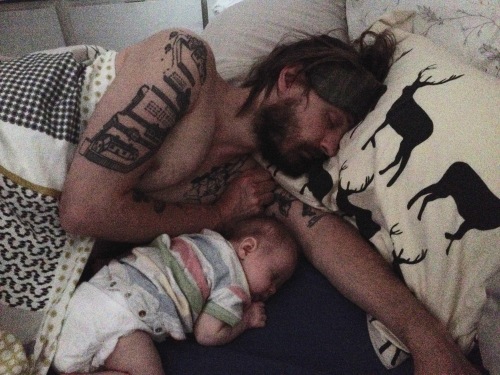 I have read thousands of words about babies in the last year, far too many. One thing I read said: “we get the baby we are supposed to get – they are sent to teach us something that we need to learn.” I don’t buy such ideas about fate and I don’t know if I have learned any brand-new life lessons. Instead familiar things have come to me in fever-pitch, gargantuan crash courses in patience, despair, exhaustion, love. In the struggle and the joy I locate many versions of myself: calm and kind, anxious and sad, impatient and furious.
I have read thousands of words about babies in the last year, far too many. One thing I read said: “we get the baby we are supposed to get – they are sent to teach us something that we need to learn.” I don’t buy such ideas about fate and I don’t know if I have learned any brand-new life lessons. Instead familiar things have come to me in fever-pitch, gargantuan crash courses in patience, despair, exhaustion, love. In the struggle and the joy I locate many versions of myself: calm and kind, anxious and sad, impatient and furious.
Yesterday, wasn’t it, that she was lying in her baby bouncer staring at the light reflecting off the wall? And today she crawls to me and says “mama!” and chooses all the blue blocks from the box and solemnly hands them to me one by one. What a total genius, I think.
I planned to have a baby but I forgot that I would also have a person. She is so person-y these days. Every day something new is revealed. She crawls furiously and waves her hands in the air and gabbles in strange pre-language that is part-Moomin, part Sarah Lund: “byah-byah-byah-jer-jer”. We squeal and blow raspberries and roll on the bed. We clean our teeth together, which she finds hysterical. She looks towards the sky, says vaguely “caaaah”. When we go in the park and she sees the trees a broad grin lights across up her face. She points at everything and says “oooooooh.”
Every time I have tried to make her do something it makes her want to do it less. Her refusals and tears, the strength of her will create a space I am forced to step backwards into and quietly wait. I become a silent witness. I cannot make anything happen. I cannot force a baby to eat. I cannot force a baby to sleep. I try and accept everything and not worry about it, but the process of accepting things is like everything else, it never ends. I keep trying and I will keep trying. When I lose perspective I lose sight of her, too, her personhood, until I spot it again and can’t imagine how she ever appeared as a cluster of problems to be solved.
She pulls herself up to standing via the back of my legs and I look down at her. Her skin is creamy and peachy at the same time and she has very very soft reddy-blond hair. She is perfectly chubby and has a round face like a little bear and big blue eyes and her dad’s round forehead. I have never seen anyone so beautiful.
The bad bits of me have appeared loudly in the last year, the part that has a few times shouted in despair at a small sleep-refusing baby, the part that has walked out of a room when they were needed, the part that has furiously kissed the baby to substitute for wanting to kick or punch something very hard. I found myself wondering why she wasn’t doing what she was supposed to be doing, wishing bitterly for her to be like the other babies, the ones who would sleep in their own cots, stay asleep in loud supermarkets, stay asleep all night.
When I put her in her cot to get her into her sleeping bag she gets very excited and kicks wildly like she is on a trampoline. She has an ecstatic look in her eye and her soft blonde hair bounces too and she looks like a small much more beautiful Boris Johnson. For two naps a day and one bedtime I say “let’s zip you into your sleepy bag, make you all cosy” as if this message can subliminally enter her consciousness and make her snoozy. It never works.
Many, many times I have rocked and fed and sung to her and patted her to sleep, bending over the cot and killing my back and seriously straining my vocal chords. I am a right mug. I am a right mum. I imagine I will be laying down with her to go to sleep when she is a toddler. She will be saying “muuuuuum I need a drink” “muuuum I am a bit hot” and refusing to let me leave until she is asleep and I will be a (mostly) willing hostage because I am soft as shit, and because of all my love. She will cause me all kinds of trouble. All this trouble will be in my head and in my life and in my heart.
Mostly, I think that she is a joy to be around. I can’t help but believe this is objectively true. I can’t help but believe that she will grow up and have everyone think this about her. I can’t help but think that boys and girls will find her very easy to love.
It is so productive to love our babies now that we know that neurologically they need it to develop into a happy adults. Loving them, doing all we can for them is playing the long game, pouring ourselves into their futures. It is many hours of playing peek-a-boo and reading the same books again and again. Of passing a piece of Lego back and forth while they shriek with joy. Of pacing the room with them in your arms.
Happy first birthday my Rosa. I love you more than anything else. I have no idea if you are the baby I was “supposed” to have. But you are the baby that I’m so glad I have. I think that every day.
Filed under: parenthood | 2 Comments
Our endless numbered days
My maternity leave is officially over. I have mixed feelings, like most mothers do. I feel ready to have “work” in my life again, and I will be sad every time that I have to walk out the house and spend the day without her, and I know she will be fine, and I will miss long lovely days with her, and I will miss long difficult days with her less. I felt excited this week about the prospect of being out in the world next week, and then I realised I hadn’t really thought about going back to work and being away from her and I suddenly cried hot, guilty tears all over her. She looked at me curiously, and I felt bad that I couldn’t prepare her for the fact that I will be around less. But, see above: she will be fine.
Yesterday I stood and looked in the mirror while I was breastfeeding her. She is massive. She is one in a few weeks, officially a toddler. Annoyingly, people are right. Time flies. I can see why people keep having babies, even though they are a bloody nightmare. It is a way of trying to hold onto time.
I know that we will have many more lovely days together. But we will have less of those days that are lovely specifically because you look after your child full-time – perhaps because you’ve had a few hard days in a row and the day seems all the better by comparison, or because you are tired and have fun in spite of it, or because you’ve nearly made it to the end of the week, or because it’s the beginning of the week and you have the sense of the full week ahead and fun stuff you can do together.
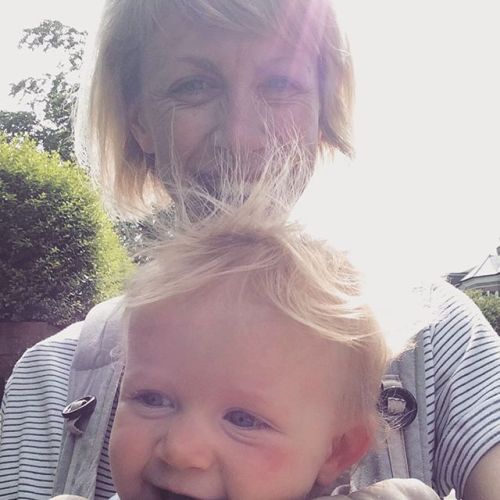
And sometimes because you get into this rhythm of small things, small moments, and it’s say Thursday at 3pm, and you’ve had nearly the whole week to get into this groove of small things and small moments and you both just seem to like it. A little routine together. Popping to the shops. A late afternoon walk. Part of me is worried that she won’t get into this pattern when we are together in the future, because she will anticipate the next time I go away and feel clingy and on-edge. But even if this is true, I suppose this is life: people leave, and they come back, and they leave again. It is one of the things I can’t protect her from.
We have had lots of great, busy days out, but mostly the ones I will remember are when we didn’t really do anything special at all. When we walked to the swings and back, or up to Sainsburys to get something and then back for lunch, a.k.a. Rosa cramming avocado and bananas and raisins and tomatoes in her mouth and saying MMMM, then swigging on her sippy cup like an old drunk. When it got to about 4pm, and I thought hmmm what shall we do now, and then she amused herself for 39 minute by gathering up clean washing in a pile around her and throwing it out again and gathering it up again.
This is one of my favourite things, to watch her become absorbed in something. She knows I’m nearby – if I try and sneak off to make a cup of tea she squawks or crawls after me – but when I am in her view, she can sit and play for a long time. She looks up at me and grins a lot, and I wave at her. I am right here, I think.
Filed under: gender | Leave a Comment
In June
When I was pregnant I read a lot of positive birth stories and it helped me feel prepared. Our baby is nearly a year old and finally I feel ready to write about birth! This isn’t exactly a positive birth story – though I did have a planned homebirth with no complications, it was long and I found it very painful. So if you are pregnant it might be a bit too warts-and-all to read right now!
At our 20 week scan the Spanish radiographer looked hard at the screen and said “yes, yes you are having a little princess.” Adam said “how, exactly, do you know it’s a girl?”, and she pointed and said “the labia”, and we felt a bit silly.
We were so happy. I am all right-on about gender but I desperately wanted a girl. Of course I would have ended up loving a boy just as much, but I was too nauseous from morning sickness to challenge my deep desire. Perhaps it was something about me being a girl. Something about me and my mum. About how I would be able to relate to the child we were having. I went into the toilet after the scan and I sank to my knees and wept in total joy. The baby was ok. I was having a girl. I will never forget the moment. It was the purest happiness I think I have ever experienced.
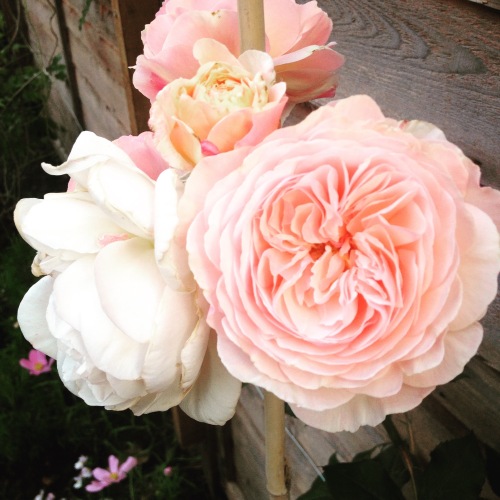 The rose I had planted in our garden started to bloom a few days before she was born, like something that would happen in a rom-com. I can still feel the oddness of the time, the weight of anticipation, the last bit of “freedom” but not really because you can’t go anywhere or do anything. You wait. You wait. We walked in parks and gardens. Went out for lunches. Tried not to worry too much or think the worst.
The rose I had planted in our garden started to bloom a few days before she was born, like something that would happen in a rom-com. I can still feel the oddness of the time, the weight of anticipation, the last bit of “freedom” but not really because you can’t go anywhere or do anything. You wait. You wait. We walked in parks and gardens. Went out for lunches. Tried not to worry too much or think the worst.
My contractions started in the middle of the Wednesday night, 20 minutes, then 7 minutes, then 5 minutes apart. Here we go, I thought. Finally. This is fucking it. It hurt, a lot. It was so intense that I remember thinking: this baby will be here tomorrow morning. But the next morning the contractions had slowed to every 15 or 20 minutes and stayed that way all day. I remember lying in our bed about 6pm watching Mike Leigh’s Nuts in May on the iPad, feeling exhausted and at sea. It was that in-between time of day when you’re tired but it’s too early for bed, and anyway, sleep would only come in snatches, a minute or two before the next contraction woke me again. And when the baby was here I would be up all night: me and sleep were over. We were on a long-term break.
The contractions came more frequently through the night but slowed again the next morning. It was now Friday. My parents were at my sister’s house in North London and I suddenly desperately wanted to see them all (and what the fuck else would we do for another long day?) They all arrived very excited and emotional with a lot of SANDWICHES. I walked around the green with my mum and sister, holding onto them and puffing my way through contractions.
Around 4pm the contractions started coming much more frequently. Flooded with oxytocin, I smiled my way through the pain and kept telling my sister “you look sooooo beautiful”. I found myself on the floor, wedged between a sofa and a table in a dark, cool spot. I must have crawled there. I remember Adam giving me peanut butter on a spoon. The midwife arrived. The hours went by and I was really starting to feel the exhaustion and thinking that this pain wasn’t funny anymore. I was making a lot of noise. I howled NOOOOOO a lot through contractions and kept insisting I could not do this. Sometimes I thought I was on the crest of the pain, that it could not get any worse, but then it did, and it lasted for maybe 30 seconds and it was just unbearable, unbearable. But we must bear the unbearable, mustn’t we.
At around 5pm I had been 5cm dilated. When she checked again about 6 hours later I was … 5cm dilated. I wanted to scream. I asked about going to the hospital, about an epidural, but the idea of calling an ambulance and having to get in it, when moving an inch made me want to vomit, was even worse than the promise of pain relief. Also I had got this far. I kept saying to the midwife, how long, how much longer, and she would say firmly “you’re nearly there. You’re doing really well. Stay positive.” But the second midwife arrived and she was more honest, saying “I can’t tell you how long it’s going to take. I’m so sorry.” I was so crushed. I wished she’d lied to me.
I lay on the floor in the bathroom in the pitch black. I sent my family away, who had been drinking wine in the conservatory and listening to my screams of agony. I could sense them nearby and wondered if my body was holding back from letting go so as to spare them the full volume of the experience.
The midwife ended up breaking my waters while I lay on the sofa: painless, strange, the warm water rushing out and down my legs. Things finally started to happen. The contractions were coming with barely any gaps in between and the pain got even worse. Nothing I had learned or practiced had prepared me for it. It was ten million times stronger than any mindfulness technique. I couldn’t reframe it at all, I kept trying to tell myself it’s your choice whether you experience this as pain and all sorts of other nonsense which had no effect whatsoever. I know women who didn’t feel the pain as pain, more of an extremely intense sensation, but this wasn’t the case for me. With each one I gripped so tightly onto Adam’s arms that I thought I would pull them off. I remember it felt like we were one joined body in the same strange dream. He appeared so calm, even if he didn’t feel it. There wasn’t a second where he was anything other than exactly what I wanted him to be.
The birth pool in our living room, the gas and air I guzzled, nothing touched the edge of the pain. It was a feeble distraction from something huge and strong. When she finally started to move down the birth canal, I was pushing for about an hour. There is that moment where the baby crowns: we can see the head, that is the only part like the movies! The utter relief that it was nearly over. And the pop – I heard it – of the moment she came out, the sting of the tear. Is she alright is she alright is she alright. So slithery and slippery and so much dark hair! It was 1am on Saturday morning, 72 hours after it had all started. Adam wept, wept, wept on my shoulder behind me. I was too stunned and exhausted to cry. I felt intense relief and disbelief about the bizarreness of birth, that I now had a live baby on my chest. Oh my god, I kept saying. Oh my god.
I lost a lot of blood and felt very faint. I heard panic in the midwive’s voice as she tried to keep me conscious, and I began to get extremely paranoid that I was going to die in childbirth and leave Adam alone with the new baby. “It’s not going to go all Jack and Sarah”, he reassured me, and fed me Coke from a can.
I breastfed her on the sofa for hours and the midwives left us, terrified, alone together. Somehow Adam managed to get the baby in a nappy and a sleepsuit. Somehow he helped me crawl to the bed while he held her. And we put her in the crib beside our bed and didn’t sleep until my parents got there and held her for us.
I couldn’t stop looking at her and I was so frightened by the scale of my responsibility for her. Another thing I couldn’t imagine until I felt it, not the true nature of it anyway. I liked her a lot right away but wasn’t sure how much I loved her because I didn’t know her yet. I didn’t know who I was dealing with. But I felt protective of her, that I would do anything if it would make her life good. In a way that made me feel like my life as I knew it was over. It used to be a thing for me, an instrument of my desires, and now it was sort of for her. I wondered what her life would hold. I wondered what she would like and be like. I wanted her to be extremely happy. I wanted everything for her.
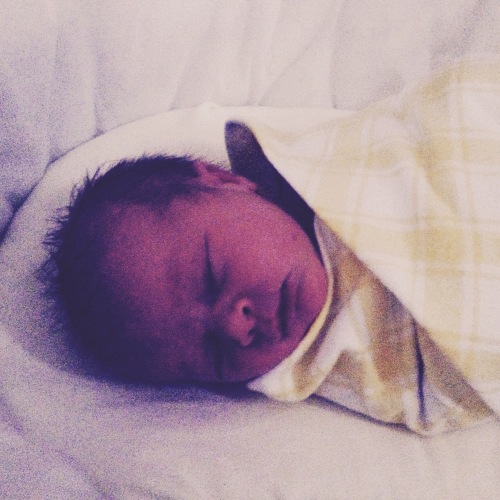
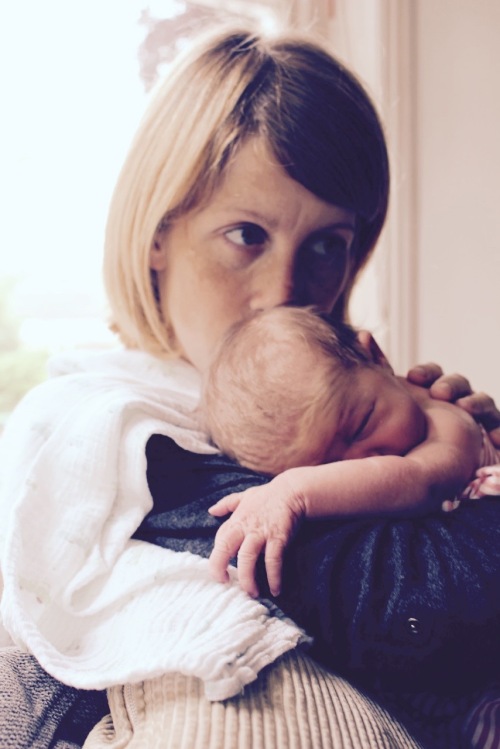
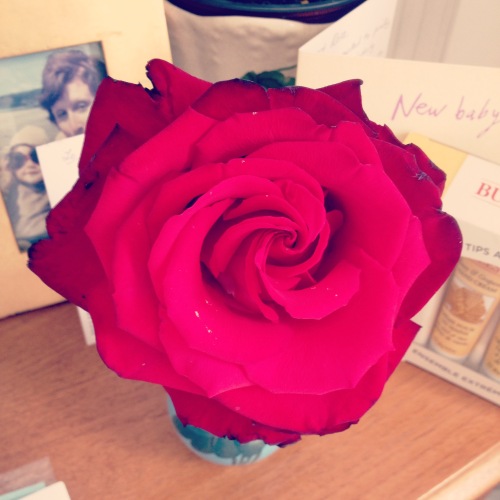
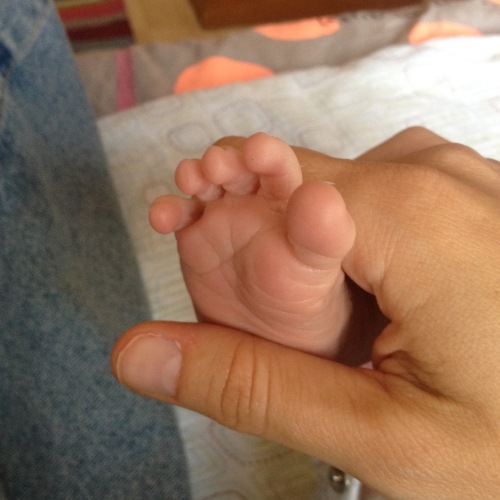
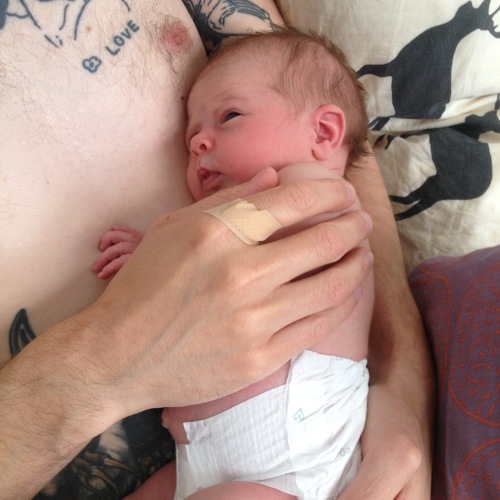
I had a homebirth via the Brierly midwife team at Kings College Hospital. They, and the care they provided, were nothing short of amazing. If you’re thinking of a homebirth in south London I can’t recommend them highly enough.
Filed under: gender | 1 Comment
My love for her seemed doomed, hopelessly unrequited. There should be songs for this, but if there were I didn’t know them.
– Jenny Offill, Dept. of Speculation
The best way to deal with separation anxiety is to give your baby reassurance – over and over again – that your absence doesn’t mean that you have gone away forever … Even if your baby’s distress is upsetting you, it’s not necessary to give up plans to go out or return to work. It’s part of her emotional growth to learn that others can care for her as well, and she can trust you to come back soon.
– NCT leaflet
i.
She is 10 days old. I leave her with her dad, I walk out of the house and around the park in front of our house. It feels terrible and wonderful to go. I cry on a really, really uncomfortable bench and try not to catch the eye of a dog walker who looks uncertain as to whether to offer me assistance. I keep an eye on my phone in case I am required, until 15 minutes have passed and I rush back.
ii.
I go out to meet some friends up the road for the evening, with a normal non-breastfeeding bra on and a necklace and a real handbag with no nappies in it. I feel a bit sick when I leave the house but also as light as a feather. My life feels a bit like I think it used to, with more possibility in it, and I miss her I miss her I miss her. Suddenly it seems strange that I have not been more generous to myself in adjusting to this new life. New mothers always feel terrible for not feeling 100% comfortable and confident in their new role, but really they have spent a lot more of their life in Topshop than they have caring for a tiny baby.
A post-natal therapist once told me that one of the first steps she takes to treat mothers with depression is to create regular opportunities for them to have time away from their baby. I didn’t get this at the time, but now I kind of get it.
iii.
I leave her with her dad while I do 3 days of yoga training, back home in the evenings too late for her bedtime but able to see her for a couple of hours in the morning. The first morning she gets terribly upset before her nap and cries and flails in the cot for what seems like forever; nothing we can do will calm her. Later on when I say goodbye to her, her face takes on a look of alarm and she holds her arms out towards me and starts to cry. It is like she is auditioning for a part in which the character must attempt to break their mother’s heart. I know I’ll have to do this many times. I do what they say you shouldn’t and go back and kiss her again, I string it out because in that moment I can’t bear not to.
It is hard to leave on a bad day. She is only 9 months old. There is so much we are both not used to yet.
This is the most I have ever been away from her, and at the session it’s hard to concentrate because I am I thinking of her every minute. I guess at the heart of the guilt and fear we have when we leave our children are the questions: will they be alright? Is it ok that I am going? Deeply I feel I “shouldn’t” be here and “should” be with her but I try not to listen to that voice because it’s the same one that told me I shouldn’t go for the 15 minute walk in the park when she was 10 days old. I don’t think it’s a voice I can rely on.
A friend said: it takes courage to leave our children. The act of leaving is an act of learning, like everything else.
iv.
I am looking after her a day after being at work, and I find it very difficult because work is such a cinch compared to baby care. With a baby your day might turn out to be amazing or terrible and there is nothing you can do about this. It is so intense, so impossible to get perspective on, to remember that it is a bad nap or a bad day and not a bad life. Of course I feel awful about how much more I enjoyed being at work than I am currently enjoying this day.
I think also that a real break from this “job” does not exist. We are not able to ever really turn away. The buck stops here, in this tender, painful place where all the mushy love and steady undoing of our defences takes place.
v.
She cries when I leave but I am told she is fine a few minutes later. Her dad sends me happy pictures every few hours and so I am happy too. They are having a lovely day.
At five o’clock I run out of the office and I run to the train station and I run from the station at the other end to get all the possible minutes left in the day with her.
I reach our driveway out of breath. I put the key in the lock and walk in and see her, and she sees me, and she sort of gasps and raises her arms towards me and lets out a series of very high excited squeaks. She cannot crawl yet but she tries to move towards me across the floor, and when I pick her up she keeps twisting her head around to look at me with the broadest grin on her face. She is very slightly shaking with excitement. She laughs a lot for the next hour.
My heart swells because of how much she loves me, because of how much I love her. Being away and coming back means I can suddenly see the scale of it, this love affair she and I have embarked on. It will never not be in my life. It will never not be nearly my whole life. It is attachment, our attachment to each other. A reward for what I’ve given to her. What luck. What an amazing hand of fate.
The evening sun is shining in the window through the slats of the blinds. I change her nappy and see freshly her perfect chubby thighs and her soft round tummy. Her hair looks so blond and long. What a big girl. In the moment I want desperately for her never to grow any bigger, for every day of my life to be a groundhog of me putting the keys in the door and seeing her seeing me and picking her up and stroking her golden hair in the golden light.
I put her to bed and she doesn’t make a squeak, she is suddenly asleep. Of course the next day is a different story, but that story isn’t for tonight. Tonight everything is perfect.
Filed under: parenthood | 1 Comment
I once tried to write a short story about people who slept in a polyphasic (segmented) pattern. It wasn’t a very good story, but the effects of sleeping like this continue to fascinate me. Apparently time stretches, so 24 hours feel like 40. People who learn to sleep in small chunks say they feel like Superman, like God. They get everything done and sometimes they go slightly mad.
Sleep is such a tease: when we have it we don’t notice, when we don’t we are crying on the floor like spilt milk. Of course, having a baby tends to cut into our sleep quota to a pretty high degree, something which you cannot fully or meaningfully interpret until you calculate that you have been getting by on 4-5 broken hours a night for months and months or years and years. NOW I know, you think, as you sob into your cereal.
But it gets better! Awful true parental cliche no. 1. The months start flying by! There goes another one. For a long time I wanted to get to the point where I was happy despite being sleep-deprived. I mean, mostly I wanted to not be sleep-deprived, but I would take a heady sleepless happiness as second-best.
I was obsessed by my lack of sleep, by my baby’s physical dependence on me to sleep, convinced I could not be happy until she “slept through the night” in her cot. But she doesn’t sleep through the night – she never has, not once at nearly 9 months old – and yet I have felt wildly happy recently. I had been so worried about it for so long and forgot to notice that the worrying about it was a lot worse than the actual “it” of it. When I realised this, I felt more energetic than I had in months, perhaps over a year. I decided I didn’t have to do anything I didn’t want to do, that it was ok to comfort-feed my baby in the night to get her back to sleep, something that was working for me at that point, even if – as the health visitor and the sleep consultant and the paediatrician and the blogs say – she doesn’t “need” to feed in the night at her age, the princely baby-age of 8.5 months old. Immediately after this, the night-time disruption seemed to barely touch the sides, and all the days that week with her were sunny and joyful. We will just go on as we are for now, I told her, and we both seemed happy about it.
Of course part of me (most of me?!) thinks fuck’s sake when I hear her crying in the night and I stumble out of bed and put on my dressing gown, slippers and go down the hall toward her. I reach her cot and she thumps her right foot against the mattress when she knows I’m there, and I pick her up and kiss her several times on her hot little cheeks as she whines, the sound of her needing me. The levels of tiredness ebb and flow: cope-able, not cope-able. There is probably no-one worse than the woman on the internet who says “just enjoy those cuddles mama! Treasure every moment! It passes so quick!”, because when you are tired you just deeply, deeply need to not be that tired, not be told to fucking enjoy it. But I understand what they are getting at. There is something tender about these peaceful night-time wake-ups, provided they don’t ask so much of us that we can’t function the next day.
Since she was born I have worried about what the right thing to do is and have been influenced by everyone and everything. The internet age is a terrible one to parent in: a hateful volume of questions, answers, opinions, utterly contradictory advice from “experts”. All the books. An entire industry that knows desperate parents will do anything to have their problem “solved”. Because every bit of baby advice has its own completely opposing solution, all you can do is go with the statements that seem truest for you. For me the things that started to resonate most strongly in this particular chapter of our lives were statements like babies wake in the night just like adults do and parenting doesn’t end at nighttime and babies don’t just feed at night for nutrition but for comfort and once you have night-weaned your baby you have potentially dropped a useful tool to get them back to sleep quickly and try not to obsess about your baby sleeping through the night; your goal is for you and your family to get the sleep you need alongside the loud voice in my head saying she is only a baby, she is only a baby. I am not so naive that I believe that different statements will come to seem truer next month, or tomorrow, and opposite statements will be more vital to other parents. That is ok.
Your baby is not a problem to be solved! I read that once, and I understood the sentiment, I really did, but all the internet posts were buzzing around my head – she will only sleep on my chest, he wakes every hour, he gets out of his big boy bed every hour in the night, do I wake her up from naps, do I leave him crying if he wakes up early from naps, she only has 30 minute naps – all from women (sorry but they are all women) in real despair. Babies are not problems but they present us with the most awful amount of shit, of course. This is parenting. It is beautiful and completely awful.
Last year I was in such a sleep-deprived fuzz that I barely noticed it was winter, but now spring is on its way. Such a cliche, so joyful! In that week where I felt so alive and awake I ran up hills with my daughter in the buggy as she made a “ssssshhhhjjjjjeeeeeee” sound of delight. When she was grumpy I threw her in the air. I made meals and did work while she slept and fell into bed in a messy exhausted heap at night. It won’t last. It will last. It’ll last as long as it lasts. We’re alive. Spring is on the way.
Filed under: parenthood | 1 Comment
